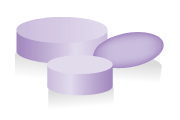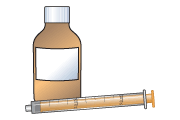Carnitine for metabolic disorders
This leaflet is for parents and carers about how to use this medicine in children. Our information may differ from that provided by the manufacturers, because their information usually relates to adults. Read this leaflet carefully. Keep it somewhere safe so that you can read it again.
Name of medicine
Carnitine (also known as L-carnitine)
Brand name: Carnitor®
Why is it important for my child to take Carnitine?
- When your child’s body digests fat in their food, it is broken down into fatty acids. The fatty acids are moved into cells and turned into energy. The body needs carnitine to move the fatty acids into the cells.
- Your child does not have enough carnitine and therefore cannot use fat properly to give them energy. They may feel tired or weak or be confused, have stomach pain or diarrhoea or be sick (vomit).
- Taking carnitine regularly should improve your child’s symptoms and make sure they have enough energy.
What is Carnitine available as?
- Tablets: 330 mg
- Chewable tablets: 1 gram
- Liquid medicine: 300 mg/ml (30%), 100 mg/ml (10%)
When should I give Carnitine
Carnitine is usually given twice each day, once in the morning and once in the evening. Ideally, these times are 10–12 hours apart, for example some time between 7 and 8 am, and between 7 and 8 pm. Give the medicine at about the same times each day so that this becomes part of your child’s daily routine, which will help you to remember.
How much should I give?
Your doctor will work out the amount of Carnitine (the dose) that is right for your child. The dose will be shown on the medicine label if you have been given a prescription.
It is important that you follow your doctor’s instructions about how much to give.
How should I give Carnitine?

Tablets
Tablets should be swallowed with a glass of water or juice. Your child should not chew the tablet.

Chewable tablets
- Chewable tablets should be chewed and then swallowed.

Liquid medicine
- Shake the medicine well.
- Measure out the right amount using an oral syringe. You can get these from your pharmacist.
- Do not use a kitchen teaspoon as it will not give the right amount.
- The liquid medicine should not be mixed in to food or drinks as this can decrease the amount your child gets.
When should the medicine start working?
It may take a few weeks for Carnitine to work properly, so your child may still have their symptoms for a while. Continue to give the medicine as you have been told to by your doctor.
What if my child is sick (vomits)?
If your child is sick less than 30 minutes after having a dose of Carnitine, give them the same dose again.
If your child is sick more than 30 minutes after having a dose of Carnitine, you do not need to give them another dose. Wait until the next normal dose.
What if I forget to give it?
If you remember up to 4 hours after you should have given a dose, give your child the missed dose. For example, if you usually give a dose at about 7 am, you can give the missed dose at any time up to 11 am. If you remember after that time, do not give the missed dose. Just give the next dose as usual.
What if I give too much?
You are unlikely to cause harm if you give an extra dose of Carnitine by mistake. If you are concerned that you may have given too much, contact your doctor or local NHS services (details at end of leaflet). Have the medicine or packaging with you if you telephone for advice.
Are there any possible side effects?
- Your child may have stomach pain, feel sick (nausea) or be sick (vomit). Giving the medicine with some food or milk may help. They might also have diarrhoea.
- You may notice your child has a fishy body odour. Using a deodorant may help to hide this. If it is still a problem after 2 weeks, contact your doctor.
There may, sometimes, be other side-effects that are not listed above. If you notice anything unusual and are concerned, contact your doctor. You can report any suspected side-effects to a UK safety scheme at http://yellowcard.mhra.gov.uk
Can other medicines be given at the same time as Carnitine?
You can give your child medicines that contain paracetamol or ibuprofen, unless your doctor has told you not to.
Check with your doctor or pharmacist before giving any other medicines to your child. This includes herbal or complementary medicines.
General advice about medicines
- Try to give medicines at about the same times each day, to help you remember.
- If you are not sure a medicine is working, contact your doctor but continue to give the medicine as usual in the meantime. Do not give extra doses, as you may do harm.
- Only give this medicine to your child. Never give it to anyone else, even if their condition appears to be the same, as this could do harm.
- If you think someone else may have taken the medicine by accident, contact your doctor straight away.
- Make sure that you always have enough medicine. Order a new prescription at least 2 weeks before you will run out.
- Make sure that the medicine you have at home has not reached the ‘best before’ or ‘use by’ date on the packaging. Give old medicines to your pharmacist to dispose of.
Where should I keep this medicine?
- Keep the medicine in a cupboard, away from heat and direct sunlight. It does not need to be kept in the fridge.
- Make sure that children cannot see or reach the medicine.
- Keep the medicine in the container it came in.
Who to contact for more information?
England: NHS 111
Tel 111
www.nhs.ukScotland: NHS 24
Tel 111
www.nhs24.scotNorthern Ireland: NI Direct
Wales: NHS 111 Wales
Tel 111
www.111.wales.nhs.ukMetabolic Support UK
0845 241 2173
www.metabolicsupportuk.orgCopyright disclaimer
Version [1]. © NPPG, RCPCH and WellChild, all rights reserved. Review by .
The primary source for the information in this leaflet is the British National Formulary for Children. For details on any other sources used for this leaflet, please contact us through our website, www.medicinesforchildren.org.uk.
We take great care to make sure that the information in this leaflet is correct and up-to-date. However, medicines can be used in different ways for different patients. It is important that you ask the advice of your doctor or pharmacist if you are not sure about something. This leaflet is about the use of these medicines in the UK, and may not apply to other countries. The Royal College of Paediatrics and Child Health (RCPCH), the Neonatal and Paediatric Pharmacists Group (NPPG), WellChild and the contributors and editors cannot be held responsible for the accuracy of information, omissions of information, or any actions that may be taken as a consequence of reading this leaflet.
